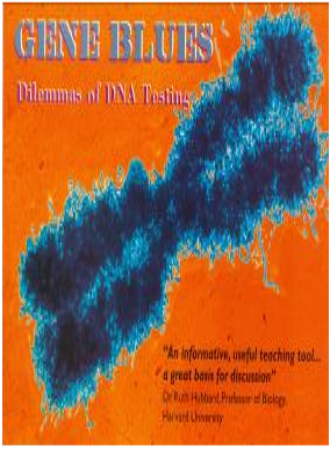
Gene Blues: Dilemma of DNA Testing 1997
Distributed by Bullfrog Films, PO Box 149, Oley, PA 19547; 800-543-FROG (3764)
Produced by Moving Images
Director n/a
VHS, color, 30 min.
High School - Adult
Health Sciences
Date Entered: 11/09/2018
Reviewed by Lori Widzinski, Health Sciences Library, University at Buffalo, State University of New YorkHow important is DNA testing? How do the results affect society, the health community, insurance companies and the individual? These are the underlying questions exposed in Gene Blues: Dilemmas of DNA Testing. Scientists have uncovered a wealth of information discovering the codes for specific diseases in our genes. We may know what causes them, but we are still lacking cures to a growing list of genetically linked afflictions. Now that we have the knowledge to collect genetic information about people in our society, will we use it ethically? Does it really help people at risk for genetic diseases?
Gene Blues points out that databanks of genetic information are being collected all over the country. The U.S. military routinely tests its personnel in an effort to reduce the chances of there continuing to be unknown soldiers. However, skeptics counter that the current policy could change at any time, and who knows how this information might be used in the future. Genetic test results are already used by health insurance companies to decide premium levels and if they will insure a patient.
Gene Blues focuses on a few different diseases: breast cancer, sickle cell anemia, Huntington's disease, and cystic fibrosis to illustrate the difficult choices patients must consider. Do you want to know if you're carrying the gene for Huntington's when several family members have already died from the disease? Would it make a difference in the decision to deliver a child if your unborn fetus were carrying the gene for sickle cell or cystic fibrosis? Dworkin and Young bring balance to this complicated and personal issue by presenting the view that perhaps we are too concerned about the genetic causes of disease, and the real concern should lie in how the social, economic, political, and environmental factors need to interweave to create cures or improve the lives of those living with diseases and disabilities. This program is a fine introduction to the variety of ways genetic information is used and can be used in our society. In 30 minutes, it can only provide a preliminary look at some hot topics. Gene Blues would serve as an excellent discussion starter for discrimination, bioethics, and privacy issues. Recommended for audiences of high school level and above.